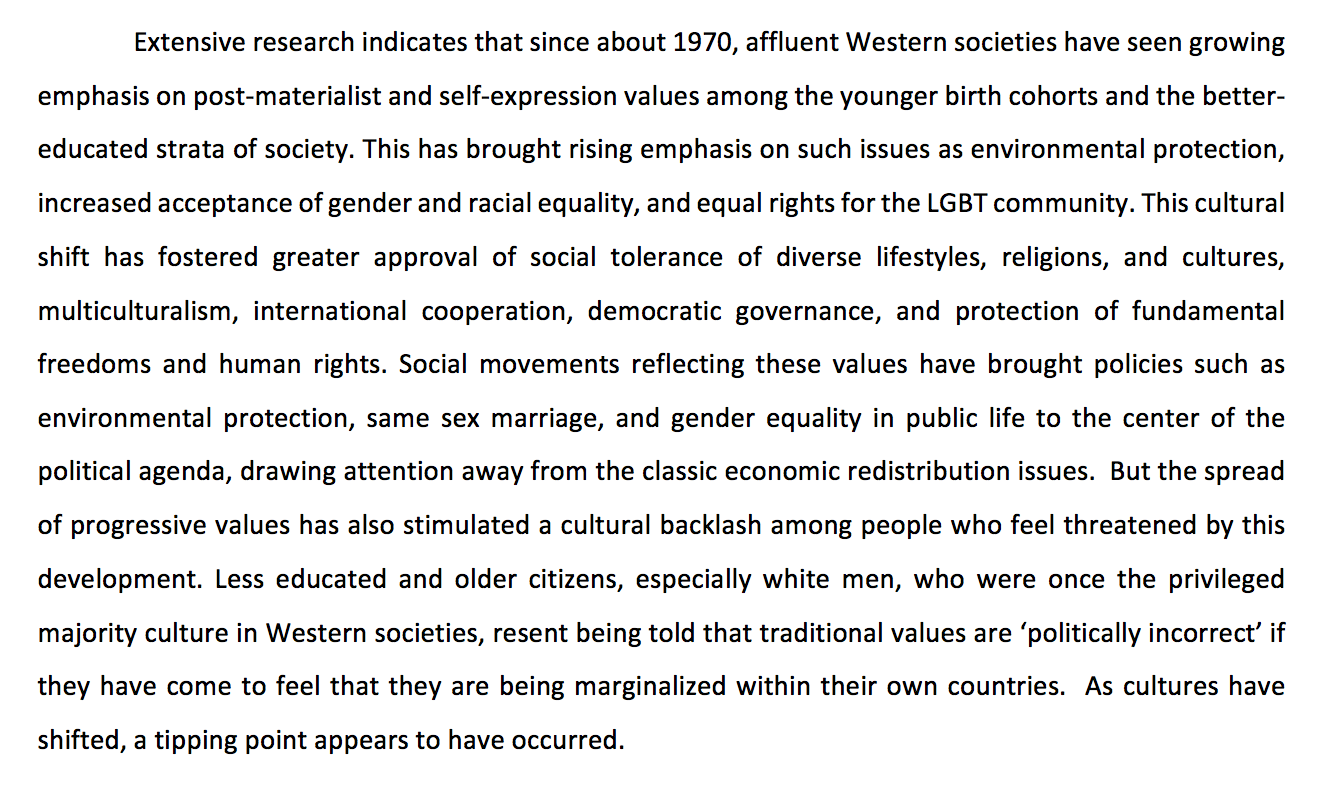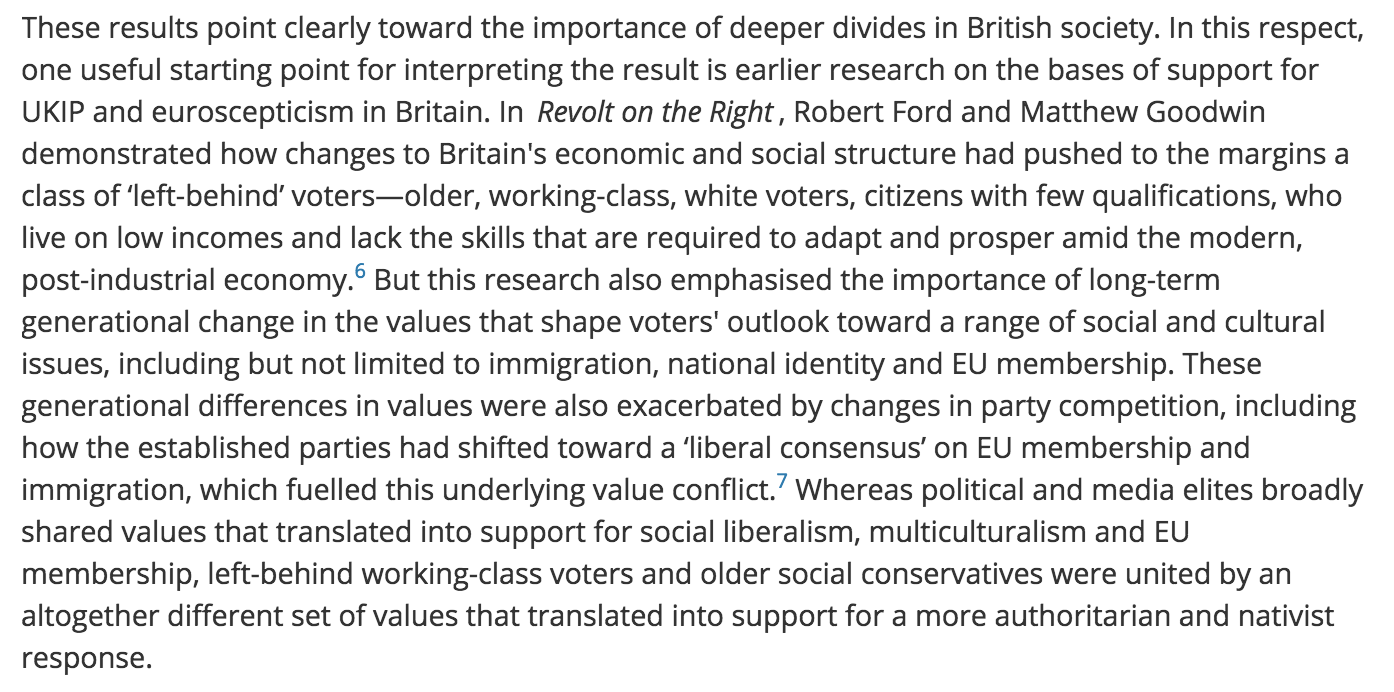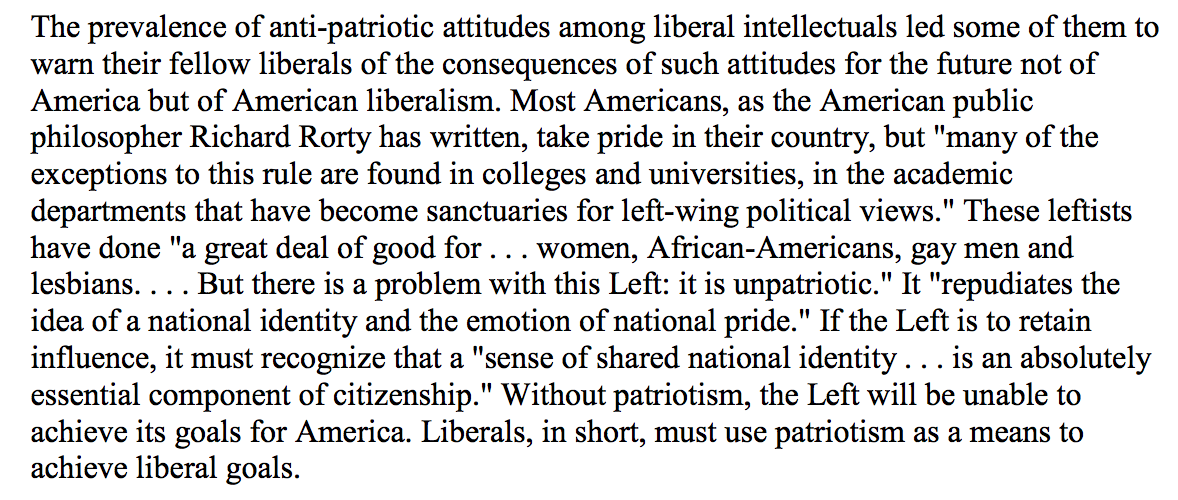Die Rechtspopulisten sind rund um den Globus mit ähnlicher Politik ähnlich erfolgreich: Irgendwas müssen sonst sehr unterschiedliche Länder wie etwa die USA, Großbritannien und Österreich also gemein haben. Auf der Suche danach bin ich auf diese Artikel und Studien gestoßen, die mich nicht alle überzeugt, aber zumindest stark zum Nachdenken gebracht haben.
Das Aufbegehren der Konservativen, denen vieles zu schnell geht:
Jan-Werner Müller, Politikwissenschafter in Princeton:
- “On one side of the new conflict are those who advocate more openness: toward minorities at home and toward engagement with the world on the outside. On the other side we find the Le Pens, Farages and Trumps: close the nation-state off by shutting borders and thereby, or so they promise, take back control; but also, preserve the traditional hierachies that have come under threat on the inside. “Make America Great Again” means above all: “Make sure white males rule again.”
Matthew Yglesias auf vox.com:
-
The social and cultural clout of nonwhite people really has grown in the United States, and demographic trends suggest that it is likely to continue growing in the near future. This is a real and important change, and whenever real and important change happens, you would expect some people to dislike the change. Trump has tapped into this resentment.
Eric Kaufmann von der University of London darüber, warum die Todesstrafe der beste Indikator für eine Brexit-Stimme ist:
- The order-openness divide is emerging as the key political cleavage, overshadowing the left-right economic dimension. This was noticed as early as the mid-1970s by Daniel Bell, but has become more pronounced as the aging West’s ethnic transformation has accelerated.
Ronald Inglehart von der University of Michigan und Pippa Norris aus Harvard haben erst im August eine Studie dazu veröffentlicht:

Matthew J. Goodwin von der University of Kent und Oliver Heath von der University of London in einer Studie zum Brexit:

Hat sich die Elite politisch zu weit vom „normalen Volk“ entfernt?
Beim Aufschrei der Massen geht es auch um „oben“ und „unten“. Viele machen „die da oben“ für das, was passiert, verantwortlich. Ich bin mir nicht sicher, finde einige Beiträge dazu aber hochinteressant. Im Quellenverzeichnis (Teil 2) zu diesem Artikel finden sich noch einige Studien, die sich mit dem „gegen die da unten wenden“ beschäftigen.
Die ZEIT geht mit der Oberschicht hart ins Gericht. Sie habe eine “unantastbare Herrschaft des Richtigen” etabliert.
- Wenn man sein biologisches Geschlecht nicht annehmen will, darf man sich bis zur Unkenntlichkeit operieren lassen, aber nicht, wenn man jünger oder besser aussehen will, als man ist? Wie soll man das jemandem außerhalb der liberalen Blase erklären?
- Schwarze Männer und Frauen werden in den USA Opfer von Polizeigewalt, sie sind von Armut betroffen, sie müssen sich gegen zahlreiche Vorurteile wehren. Doch es gibt noch eine andere Gruppe von Ausgegrenzten. Über sie, die den Fortschritt nicht so schnell begreifen, kann man auch in Zeiten der inklusiven Sprache alles Verächtliche sagen: über die Unsicheren, die Unbegabten, die Ängstlichen, über die weißen Männer. Ihre Wünsche, ihre Bedürfnisse, ihre Ängste, ihre Biografien – alles ein Witz. Man kann sie white trash nennen, oder Arbeiter, Arbeitslose, Ungelernte. In jedem Fall sind sie die Unbeliebten, weder weltgewandt noch selbstironisch. Sie sind die Gekränkten.
Jonathan Haidt über eine liberale, kosmopolitische Elite, die zu wenig auf Menschen mit einem anderen Weltbild Acht gibt:
- One must first look at the globalists, and at how their changing values may drive many of their fellow citizens to support right-wing political leaders. In particular, globalists often support high levels of immigration and reductions in national sovereignty; they tend to see transnational entities such as the European Union as being morally superior to nation-states; and they vilify the nationalists and their patriotism as “racism pure and simple.”
- Haidt überzeugt mich hier nicht. Aus Interesse habe ich trotzdem versucht, die Österreicher nach diesem hier beschriebenen Konzept aufzuteilen. Laut EVS sind 48 Prozent der Menschen „sehr stolz“ und 42 Prozent „ziemlich stolz“, Österreicher zu sein. 6,6 Prozent beschreiben sich als Europäer, 5,6 Prozent als Weltbürger.
Ross Douthat in der New York Times: Die Kosmopoliten lügen sich selbst an. Und das ist ein Problem, weil es ihre Sicht auf andere trübt.
- “It’s a problem that our tribe of self-styled cosmopolitans doesn’t see itself cleary as a tribe: because that means our leaders can’t see themselves the way the Brexiteers and Trumpistas and Marine Le Pen voters see them”
- “They can’t see that their vision of history’s arc bending inexorably away from tribe and creed and nation-state looks to outsiders like something familiar from eras past: A powwerful caste’s self-serving explanation for why it alone deserves to rule the world.”
Den Republikanern ist es lange gelungen, die sozial Konservativen, die lieber nach innen schauen, mit ihren ideologischen Brüdern, die oft aus wirtschaftlichen Gründen weltoffener sind, zu vereinen. Sean Trende:
- “Trump is a creation of the Republican establishment, which is frankly uncomfortable with many of its own voters, and which mostly seeks to “manage” them.”
Trump spricht eine völlig andere Sprache als andere Politiker. Das kommt an. David Byler hat das statistisch analysiert. Eines der wichtigsten Wahlmotive für Trump ist, „he tells it like it is“.
Der Politikwissenschafter Samuel Huntington hat 2004 in The National Interest zu einem Divide zwischen der transnationalen Elite und dem „einfachen Volk“ geschrieben. Er unterscheidet die Elite noch einmal:
- “Economic transnationalism is rooted in the bourgeoisie, moralistic transnationalism in the intelligentsia.”

Viele fühlen sich zurückgelassen. Ein Beitrag im Guardian:
- Most of all, Trump voters want respect. They want respect for their long hours of work that risks their bodies, for the hands caught in vices, backs wrenched by weights, and knees torn. They want respect because they are doing dangerous work, but their pay has been flat for decades.
- They want respect because they haven’t just lost economically, but also socially. When they turn on the TV, they see their way of life being mocked and made fun of as nothing but uneducated white trash.
- With Trump, they are finding someone who gives them respect. He talks their language, addresses their concerns. Sometimes it is celebrating what defines their neighborhood, what they in Parma have in common: being white. They and Trump are playing in dangerous territory, with the need for respect tipping into misplaced revenge.
Eine gute Erklärung zum Zusammenhang mit Protest gegen TTIP von Constantin Seibt im Tagesanzeiger:
- Der Slogan «Eine andere Welt ist möglich» wird ergänzt durch «Die Welt von gestern ist möglich.» Damit hat die globalisierungskritische Bewegung derart stark an Kraft gewonnen.
Was ist jetzt zu tun?
David Goodhart im Prospect Magazine:
- Most traditional societies are “sociocentric”, meaning they place the needs of groups and institutions first. Today most rich societies are “individualistic”, making society a servant of the individual. Yet even in these countries, significant traces of our more sociocentric and “groupist” past are to be found in peoples instincts and moral intuitions.”
- The thinking behind The Righteous Mind may be the last hope for European liberalism. Indeed this book should be the scientific manual for the movement that I have called post-liberalism — those from centre-left and centre-right, including Blue Labour and Red Toryism, who argue that both economic and cultural liberalisms have “overshot” in the past generation to the particular detriment of the bottom half of society.
- Post-liberalism, like the promised land of a post-racial politics, does not seek to refight old battles but to move on from victories won. Its concern is not to repeal equality laws, or reject the market economy, but rather to consider where the social glue comes from in a fragmented society. To that end, it acknowledges authority and the sacred as well as suffering and injustice. It recognises the virtues of particular loyalties—including nations—rather than viewing them as prejudices. And it seeks to apply these ideas to the economic as well as the social sphere.